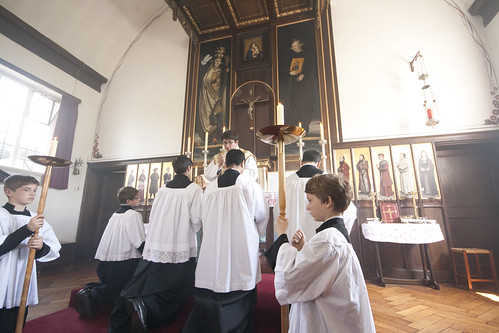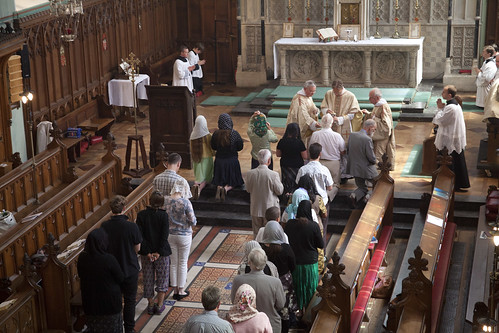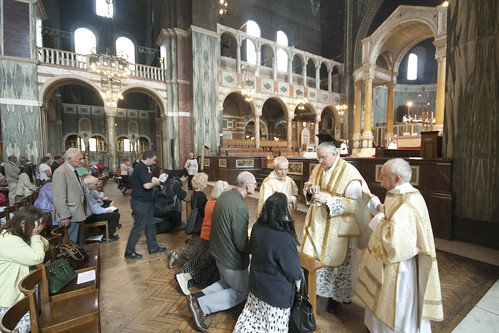 |
| Fr Daniel Lloyd of the Ordinariate celebrating the EF in SS Gregory & Augustine's, Oxford. |
The subject of Mgr Basil Loftus article in the Catholic Times of 1st August is frequent Communion.
...it is really quite astounding that there should currently appear to be a campaign, led by some bishops in England and Wales, to play down the very desireability of frequent Holy Communion, to the extent that another Catholic newspaper, The Tablet, by no means alarmist or addicted to 'screaming headlines', recently warned: 'Frequent Communion in Question.'
Let's rewind the tape a bit. In the 12th July issue, the Tablet ran a story reporting some remarks of Bishop Alan Hopes, the new bishop of East Anglia, which included this passage.
“People at Mass have a view – ‘What do I get out of this?’,” he said. “We have shifted to a practice where everybody gets up for Communion and makes it awkward for those who can’t go to Communion.”
The headline was
Hopes says Mass has become consumerised (link for subscribers)
In the next issue, The Tablet published three letters criticising Bishop Hopes, one from the deeply depressing lay(icised) theologian Nicholas Lash, another from Mgr Loftus himself. The latter read:
To suggest that because people have “a sense of entitlement about receiving Holy Communion”, they are unacceptably becoming part of a “consumer society”, directly contradicts the Catechism of the Catholic Church: “it is in keeping with the very meaning of the Eucharist that the faithful, if they have the required disposition, receive Communion each time (italics in original) [sic] they participate in the Mass”, (n.1388). Of course “we expect Communion at every Mass, and Mass has become the most prevalent service”. That is what being a eucharistic community is all about. The Church makes the Eucharist and the Eucharist makes the Church. For the very bishop charged with promoting liturgical observance to suggest otherwise is deeply disturbing.
It was these letters which got the headline
Frequent Communion in question (link for subscribers)
Readers can decide for themselves what view The Tablet took of this exchange, but they did not use that headline as a quasi-editorial comment on Bishop Hopes' remarks, but to indicate the content of Loftus' own frothings about it - and those of his fellow correspondents. They once printed a letter of mine beneath the headline 'Enthusiasm of young for old rite'.
I report this because it illustrates a number of points I have been making about Mgr Loftus over the months.
1. He has no intellectual integrity.
How can you argue with someone who writes, in a newspaper column, things which he knows aren't true? It is not a matter of a divergent interpretation, but of someone who just doesn't care. If you challenged him he would, as always, have something to point to: the headline. But if you actually look it up it quite obviously doesn't support his argument in the way he claims. This is absolutely typical of Loftus. There's no engaging with him, but it is important to point out his superficially plausible falsehoods. Those without a subscription to The Tablet have no way independent way of knowing it was not true.
2. His level of polemic is far below even that of The Tablet.
I've made plenty of criticisms of The Tablet, but Loftus is on a completely different level. Whether it is fear of reprisals or journalistic self-respect, they don't print obvious and trivial falsehoods like this. It reminds me of a remark by the Australian Catholic politician, Arthur Calwell, who was leader of the Australian Labor Party, about Australian Communists.
If these people went to Russia, Stalin wouldn't even use them for manure.
If Loftus turned up at The Tablet, he wouldn't get a job cleaning the loos.
 |
| Fr Armand de Malleray FSSP distributing Holy Communion at the LMS Day of Recollection at St Edmund's College, Ware. |
3. His attacks on the hierarchy are more persistent, more open, more extreme, and more unfair, than anything served up by a mainstream Traditional Catholic.
There is simply no one who can be described as part of the conversation among Catholics in the UK - which is to say, leaving aside those totally off the radar in either direction, whether it be sede vacantists or women-priest ordaining fantasists - who is as remotely hostile to our bishops as Mgr Basil Loftus. In this article he refers to Bishop Alan Hopes without naming him, but he names, and attacks, Cardinal Nichols and Bishop Michael Campbell of Lancaster. In other columns he has attacked Bishop Davies of Shrewsbury (whose remarks 'might even call for anger'), Cardinal Ranjith ('the Sri Lankan cappa magna fetishist and Tridentine-rite devotee'), Cardinal Müller (under whom the CDF is 'not fit for purpose'), Bishop Hugh Gilbert of Aberdeen (without naming him), his former ordinary Archbishop Roche (without naming him), and the Papal Nuncio. He has also made extraordinarily vicious swipes at the Congregation for Divine Worship, the Office of Papal Celebrations and its head, Mgr Marini, the PCED, the Ordinariate, and any bishop who has had anything to do with the Traditional Mass (of whom there are, these days, many). And again, and again, and again, Pope Benedict XVI.
This, remember, is in a newspaper which enjoys ecclesiastical approval, which is sold at the back of Catholic churches, has 'Catholic' in its name, and bears the legend 'Follow Peter' on its masthead.
Talk about about a lack of loyalty to the hierarchy by Traditional Catholics, which used to be something of a parlour game among conservative Catholics, has to be set into this context. For some inscrutable reason (which I've discussed here), the bishops of England and Wales, and Scotland, have chosen to put up with this clown's columns since the early 1990s.
4. Loftus never engages with the substance of the teaching he attacks.
Loftus presents the remarks of the various bishops about the problems presented by the over-casual frequent reception of Holy Communion as simply incomprehensible, motiveless attempts to stop people benefitting spiritually from the Sacrament. Never in the entire column, which takes up more than half a broadsheet page, does he so much as mention the possibility that receiving Communion in a state of grave sin does not confer spiritual benefits on the communicant, or the possibility that people should be encouraged to prepare more carefully, receive more reverently, and give thanks afterwards more gratefully, in order to receive more spiritual benefit from it. It is as if these considerations, which are clearly in the minds of the bishops, did not exist.
In fact, this has been a concern at the highest levels of the Church for decades. Back in 1980, St John Paul II noted:
Sometimes, indeed quite frequently, everybody participating in the eucharistic assembly goes to Communion; and on some such occasions, as experienced pastors confirm, there has not been due care to approach the sacrament of Penance so as to purify one’s conscience.
There more on this in the FIUV Position Paper on the Eucharistic Fast.
The importance of this point is that in no sense can Loftus be regarded as a valid or useful contribution to the debate. A liberal Catholic who articulated the claim that we don't need to worry about popping up to Communion regardless of our spiritual state, as if it were sweeties which were being handed out, because there is no such thing as an objective state of sin, and / or because the Eucharist does not really contain the Body, Blood, Soul and Divinity of Our Lord Jesus Christ, but just some kind of symbolic reminder - such a liberal might help to clarify the issues and advance the discussion. That is the kind of article, however, which the Catholic press would never print. Instead, they print this kind of thing, which by subterfuge and omission undermines the teaching without confronting it clearly. It serves to do nothing but confuse its readers and alienate them from the teaching of their bishops.
5. Loftus is losing the argument.
Like many liberals, Mgr Loftus is always fighting a rear-guard action. He protested in the most intemperate terms about the corrected English translation of the Novus Ordo Missal: in vain. He has railed repeatedly about the Ordinariate of Our Lady of Walsingham and the legal status of the Traditional Mass: in vain. But it is not just in Rome, under Pope Benedict, where things have been going badly for him. Here he is whining about increasingly urgent attempts by our own bishops, by no means some group of ultra-conservative 'usual suspects' but perfectly mainstream members of the Bishops' Conference, to do something about the lack of respect for the Blessed Sacrament. We can look forward to him complaining about recent statements condemning over-the-top behaviour at the Sign of Peace. This, remember, is under Pope Francis, by whom Loftus sets such store.
Why, the reader may ask, am I so concerned about Loftus, if he is always on the losing side of the argument? Taking the long view, it is clear that the liberals are losing the argument about almost everything about the liturgy and pastoral theology. It is possible to look ahead, on current trends, to the restoration of Altar Rails, the systematic encouragement of Communion on the Tongue, more frequent Confession, and perhaps a longer Eucharistic Fast: and similar developments in other areas of the Church's life.
But how many of the nominal Catholics in the pews today are the new generation of Bishops and priests going to take with them? Are we going to end up with a conservative Novus Ordo being celebrated by zealous young priests in empty churches?
If those Catholics interested enough in the Faith to read The Catholic Times are continually fed Loftus-style propaganda, it makes the preparation of the Faithful for liturgical re-sacrilisation much, much harder. Perhaps no one cares about this except me and my faithful blog readers, but it ought to be a serious concern for our bishops. By tolerating Loftus, they are making their jobs that much harder. And their job, remember, is an important one: it is the salvation of souls.
 |
| Fr Anthony Glaysher distributing Holy Communion at the LMS AGM Mass in Westminst Cathedral. |
Support the work of the LMS by becoming an 'Anniversary Supporter'.
No comments:
Post a Comment